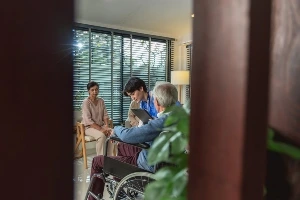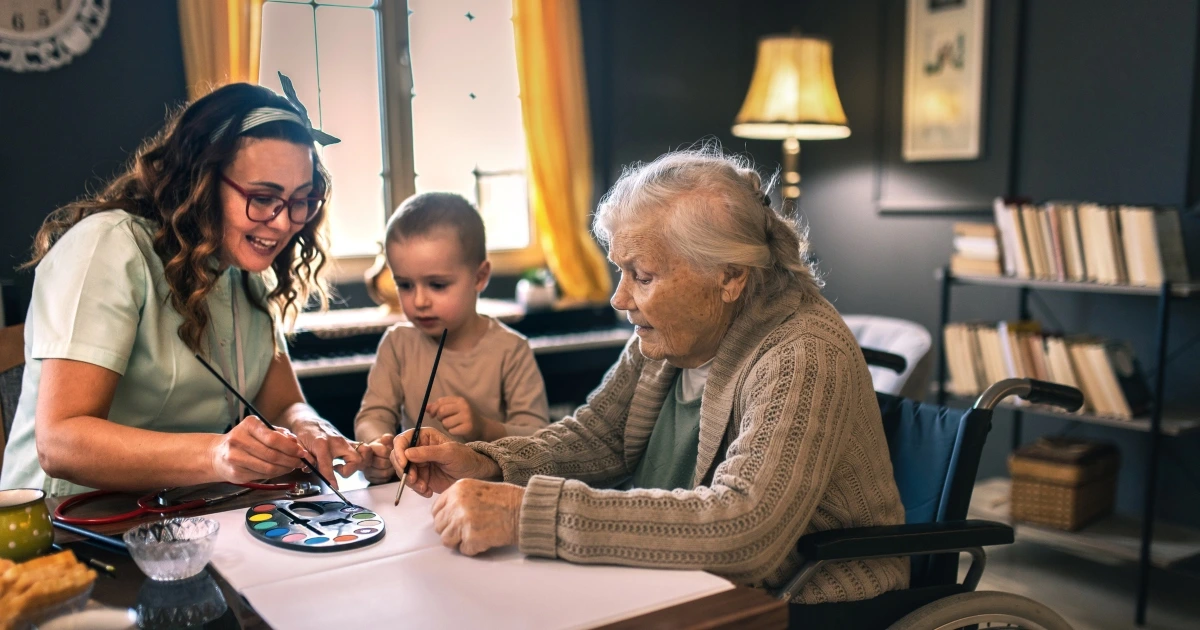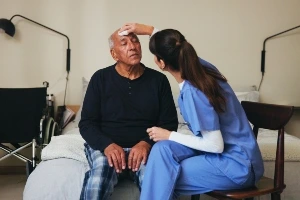
Behind the closed doors of long-term care facilities, many vulnerable residents may become victims of nursing home abuse. Unfortunately, residents may suffer in silence as these acts of abuse may often go unreported.
Nursing home abuse and negligence can go unreported for various reasons. Perpetrators may intimidate victims into silence, and family members may often be unaware anything has happened. In this blog, we discuss six common reasons residents may not report nursing home abuse and what families can do to better protect their loved ones.
At PKSD, we are here to help you if you suspect that your loved one is being abused or neglected in a nursing home. Do not hesitate to seek legal counsel from our knowledgeable Albuquerque nursing home abuse attorneys. We can discuss your situation and determine what legal options you may have during a free consultation.
Schedule your free case review with a qualified PKSD attorney today: 505-677-7777.
Fear of Retaliation
Nursing home residents who experience abuse often remain silent due to an overwhelming fear of retaliation, especially in cases where perpetrators are staff responsible for a resident’s daily care.
Residents depend on staff for basic needs like bathing, eating, dressing, and medication. Caregivers have a lot of power they can wield over a resident, and some forms of mistreatment are harder to prove. For example, delayed responses to call buttons, “forgetting” to help with meals, or providing less attentive care are all forms of abuse.
When residents do report incidents of abuse, staff may label them as troublemakers or deliberately isolate them from activities or time spent with other residents.
For many residents, their nursing home is their permanent home. Unlike a hospital stay, they cannot simply leave after treatment. This permanence creates a power imbalance that makes reporting abuse intimidating.
Staff members and caregivers may retaliate in different ways. Some residents may have experienced direct threats from abusive staff members. These threats often include warnings about making care worse or threatening to restrict family visits. Sometimes, threats can lead to devastating results, especially for those with limited mobility or mental health conditions.
Cognitive Impairments and Communication Barriers
Many nursing home residents face significant cognitive impairments that make it difficult for them to communicate when they have experienced abuse. Conditions like Alzheimer’s disease and dementia affect many nursing home residents in Albuquerque facilities, creating ideal conditions for abuse to remain hidden.
When a resident struggles to remember recent events, they may experience abuse but forget the details hours later. This memory impairment makes it nearly impossible to provide consistent reports or identify abusers by name. Even when they recall mistreatment, their history of cognitive challenges often means any incidents reported may not be taken seriously.
Below are other medical conditions that can result in cognitive impairments and communication barriers:
- Speech Impairments: If residents suffer from aphasia after a stroke, it could make it difficult to form words or sentences despite understanding what is happening around them.
- Dysarthria: Physical limitations that affect speech clarity. In some cases, family or staff may dismiss or misunderstand resident’s complaints.
- Language Barriers: Residents who primarily speak Spanish or Native American languages may lack access to staff who understand them. During moments of stress or fear, many revert to their native language, further complicating attempts to report abuse.
- Hearing Impairments: Without properly functioning hearing aids or accommodations, these residents remain effectively isolated from help. Residents who cannot fully understand questions about their care may nod or agree without truly understanding what they are being asked.
Shame and Embarrassment
Many nursing home residents endure abuse silently due to feelings of shame and embarrassment. For individuals who value independence and privacy, admitting to mistreatment can feel humiliating.
Physical abuse often leaves visible bruises or injuries in intimate areas that residents feel uncomfortable discussing. When abuse involves toileting accidents, bathing issues or sexual mistreatment, the embarrassment may intensify. Many residents would rather suffer in silence than describe these degrading experiences to family members or authorities.
Cultural factors significantly impact reporting in Albuquerque’s diverse communities. In some cultures, it may be discouraged to “air family problems” if the abuse is coming from a relative who is visiting a resident.
Many elderly residents internalize their abuse, believing they somehow deserve mistreatment or are burdens to their caregivers. This misplaced guilt prevents them from advocating for themselves, especially when staff members reinforce these harmful beliefs through comments like “you are too much trouble” or “no one else complains.”
Family dynamics complicate matters further. Many residents may not report abuse because they do not want to make their children worried or cause family conflict. They fear becoming a “problem” that results in stressful decisions about alternative care arrangements or financial burdens.
Dependency on Caregivers
Residents rely on staff for fundamental necessities like medication, food, bathing, toileting and mobility assistance. This reliance creates a power imbalance that makes reporting abuse extremely difficult. When the person who helps you eat is the same person mistreating you, speaking up feels impossible.
The relationship between caregivers and residents becomes complicated by the intimate nature of nursing home care. Despite experiencing abuse, many residents develop attachments to their caregivers—even abusive ones. This phenomenon, similar to Stockholm syndrome, makes residents reluctant to report staff members they have grown emotionally dependent on.
Many nursing home residents require assistance with multiple daily activities. Each interaction represents another opportunity for potential retaliation if they report mistreatment. The more care someone needs, the more vulnerable they become to this dependency trap.
Staffing shortages in nursing homes intensify this dependency. When facilities operate with minimal staff, residents understand that reporting abuse could result in losing caregivers who will not be replaced quickly. They may tolerate mistreatment rather than risk having no care at all.
Lack of Knowledge About Rights
Nursing home residents may not understand, or fully understand, what legal protections they have against abuse. The Nursing Home Reform Act and New Mexico state laws grant specific rights to every resident, including the freedom from abuse and neglect. Yet, some facilities may rarely explain these protections in a meaningful way.
Residents often incorrectly believe that signing admission paperwork means surrendering their legal rights. They do not realize they maintain their full civil liberties, including the right to complain without retaliation. The reporting process itself remains a mystery to most, as they are unsure who to contact outside the facility or how to document problems effectively.
Financial concerns further complicate reporting. Many residents worry that speaking up will cause them to be discharged with nowhere to go. They are unaware that facilities cannot legally evict residents for reporting abuse. Families can help by advocating for their loved ones when they cannot defend themselves. They can also ensure their loved ones understand their basic rights, explaining them in simple, straightforward language.
Previous Failed Reporting Attempts
Many nursing home residents in Albuquerque stop reporting abuse if they initially reported other incidents but got no response or help. When staff dismiss the concerns of residents without even looking into them, residents may feel that it is pointless to speak up. Staff may make comments to residents, like “you must be confused” or “that is not what happened,” to further discourage residents from speaking up.
Family members sometimes unintentionally contribute by minimizing reports with comments like “I’m sure they did not mean it that way.” When facilities conduct superficial investigations that find “no evidence” despite clear signs of abuse, residents lose faith in the reporting system.
What Families Can Do to Protect Loved Ones From Nursing Home Abuse?
Families serve as essential advocates for nursing home residents who may be unable or afraid to report abuse themselves. Here is how you can help:
- Visit Unexpectedly: See your loved one at different times and days to get an accurate picture of care quality and show staff that someone is watching.
- Create Private Conversations: Speak with your loved one about their well-being in a private setting, away from staff, so they can discuss any scenario freely without fear of being overheard.
- Watch for Warning Signs: Look out for unexplained injuries, weight loss, poor hygiene, withdrawal or fear around specific caregivers.
- Document Everything: Note the dates, take photos and document details of concerning conditions or incidents.
- Build a Support Network: Communicate with other residents’ families to notice patterns and share observations.
- Know Where to Report: File formal complaints with both the facility administrator and New Mexico’s Adult Protective Services.
- Reassure Your Loved One: Let your loved one know that reporting will not lead to abandonment or punishment.
- Consult an Attorney: Speak to an attorney early to help you and your family navigate the reporting process and all other legal matters.
Legal Options That May Help You Protect a Victim of Nursing Home Abuse
Nursing home residents who experience abuse in Albuquerque have several legal pathways to pursue justice and protection. When residents and their families are aware of their legal options, it empowers them and their families to take effective action.
Here are some of the actions that you can take to protect your loved one’s legal rights:
- File a Regulatory Complaint: File a complaint with the New Mexico Department of Health, which can investigate allegations, issue citations and impose penalties on facilities that violate standards of care.
- Pursue a Civil Lawsuit: File a lawsuit against the nursing home for negligence, abuse, breach of contract or violation of residents’ rights. These cases can seek compensation for medical expenses, pain and suffering and sometimes punitive damages.
- Seek an Emergency Protective Order: If the resident faces immediate danger, seek an emergency protective order from law enforcement. This enables rapid intervention while longer-term solutions are being arranged.
- Report Criminal Abuse: Contact local law enforcement when abuse rises to the level of assault, battery, theft or sexual abuse. Criminal charges can be pursued along with civil actions.
- File a Claim: You can file a claim under the New Mexico Adult Protective Services Act. This provides additional protections specifically for vulnerable adults.
- Request Facility Transfer: In some cases, it may be best to transfer to a safer environment while maintaining legal actions against the original facility.
Call PKSD if You Suspect Your Loved One Is Dealing with Nursing Home Abuse or Neglect
Recognizing the signs of nursing home abuse and why nursing home residents may not report these incidents can help you to better protect your loved one in a nursing home.
At PKSD, we believe every resident deserves dignity, respect and protection. Our trusted law firm has been advocating for victims of nursing home abuse for decade. We have extensive knowledge of New Mexico nursing home laws, and we are deeply committed to holding perpetrators of nursing home abuse accountable.. Not sure if you have a case? Call our law offices today to get answers to your questions. Your initial consultation is completely free, and if we represent you, There are no upfront costs or fees to pay.
PKSD. We get results for you.: 505-677-7777.






